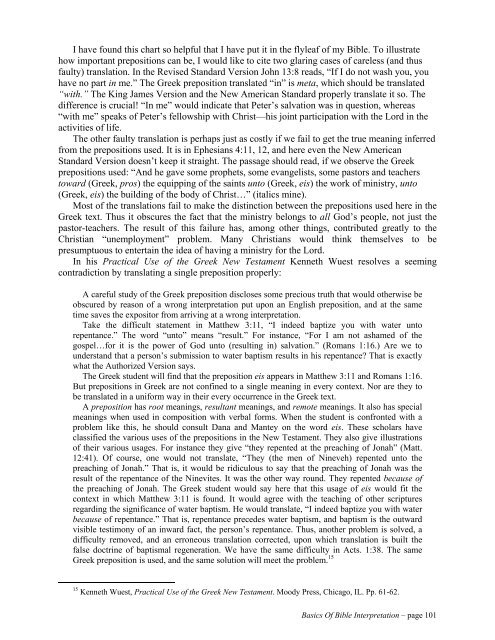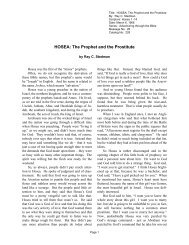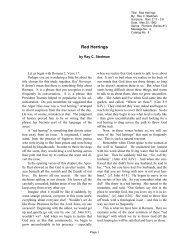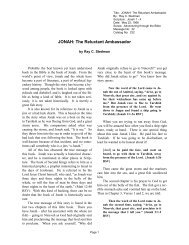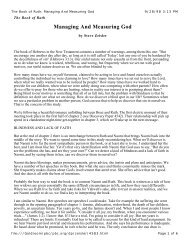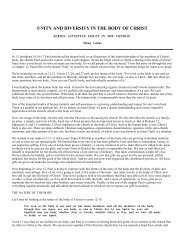Basics of Bible Interpretation - RayStedman.org
Basics of Bible Interpretation - RayStedman.org
Basics of Bible Interpretation - RayStedman.org
You also want an ePaper? Increase the reach of your titles
YUMPU automatically turns print PDFs into web optimized ePapers that Google loves.
I have found this chart so helpful that I have put it in the flyleaf <strong>of</strong> my <strong>Bible</strong>. To illustrate<br />
how important prepositions can be, I would like to cite two glaring cases <strong>of</strong> careless (and thus<br />
faulty) translation. In the Revised Standard Version John 13:8 reads, “If I do not wash you, you<br />
have no part in me.” The Greek preposition translated “in” is meta, which should be translated<br />
“with.” The King James Version and the New American Standard properly translate it so. The<br />
difference is crucial! “In me” would indicate that Peter’s salvation was in question, whereas<br />
“with me” speaks <strong>of</strong> Peter’s fellowship with Christ—his joint participation with the Lord in the<br />
activities <strong>of</strong> life.<br />
The other faulty translation is perhaps just as costly if we fail to get the true meaning inferred<br />
from the prepositions used. It is in Ephesians 4:11, 12, and here even the New American<br />
Standard Version doesn’t keep it straight. The passage should read, if we observe the Greek<br />
prepositions used: “And he gave some prophets, some evangelists, some pastors and teachers<br />
toward (Greek, pros) the equipping <strong>of</strong> the saints unto (Greek, eis) the work <strong>of</strong> ministry, unto<br />
(Greek, eis) the building <strong>of</strong> the body <strong>of</strong> Christ…” (italics mine).<br />
Most <strong>of</strong> the translations fail to make the distinction between the prepositions used here in the<br />
Greek text. Thus it obscures the fact that the ministry belongs to all God’s people, not just the<br />
pastor-teachers. The result <strong>of</strong> this failure has, among other things, contributed greatly to the<br />
Christian “unemployment” problem. Many Christians would think themselves to be<br />
presumptuous to entertain the idea <strong>of</strong> having a ministry for the Lord.<br />
In his Practical Use <strong>of</strong> the Greek New Testament Kenneth Wuest resolves a seeming<br />
contradiction by translating a single preposition properly:<br />
A careful study <strong>of</strong> the Greek preposition discloses some precious truth that would otherwise be<br />
obscured by reason <strong>of</strong> a wrong interpretation put upon an English preposition, and at the same<br />
time saves the expositor from arriving at a wrong interpretation.<br />
Take the difficult statement in Matthew 3:11, “I indeed baptize you with water unto<br />
repentance.” The word “unto” means “result.” For instance, “For I am not ashamed <strong>of</strong> the<br />
gospel…for it is the power <strong>of</strong> God unto (resulting in) salvation.” (Romans 1:16.) Are we to<br />
understand that a person’s submission to water baptism results in his repentance? That is exactly<br />
what the Authorized Version says.<br />
The Greek student will find that the preposition eis appears in Matthew 3:11 and Romans 1:16.<br />
But prepositions in Greek are not confined to a single meaning in every context. Nor are they to<br />
be translated in a uniform way in their every occurrence in the Greek text.<br />
A preposition has root meanings, resultant meanings, and remote meanings. It also has special<br />
meanings when used in composition with verbal forms. When the student is confronted with a<br />
problem like this, he should consult Dana and Mantey on the word eis. These scholars have<br />
classified the various uses <strong>of</strong> the prepositions in the New Testament. They also give illustrations<br />
<strong>of</strong> their various usages. For instance they give “they repented at the preaching <strong>of</strong> Jonah” (Matt.<br />
12:41). Of course, one would not translate, “They (the men <strong>of</strong> Nineveh) repented unto the<br />
preaching <strong>of</strong> Jonah.” That is, it would be ridiculous to say that the preaching <strong>of</strong> Jonah was the<br />
result <strong>of</strong> the repentance <strong>of</strong> the Ninevites. It was the other way round. They repented because <strong>of</strong><br />
the preaching <strong>of</strong> Jonah. The Greek student would say here that this usage <strong>of</strong> eis would fit the<br />
context in which Matthew 3:11 is found. It would agree with the teaching <strong>of</strong> other scriptures<br />
regarding the significance <strong>of</strong> water baptism. He would translate, “I indeed baptize you with water<br />
because <strong>of</strong> repentance.” That is, repentance precedes water baptism, and baptism is the outward<br />
visible testimony <strong>of</strong> an inward fact, the person’s repentance. Thus, another problem is solved, a<br />
difficulty removed, and an erroneous translation corrected, upon which translation is built the<br />
false doctrine <strong>of</strong> baptismal regeneration. We have the same difficulty in Acts. 1:38. The same<br />
Greek preposition is used, and the same solution will meet the problem. 15<br />
15 Kenneth Wuest, Practical Use <strong>of</strong> the Greek New Testament. Moody Press, Chicago, IL. Pp. 61-62.<br />
<strong>Basics</strong> Of <strong>Bible</strong> <strong>Interpretation</strong> – page 101


